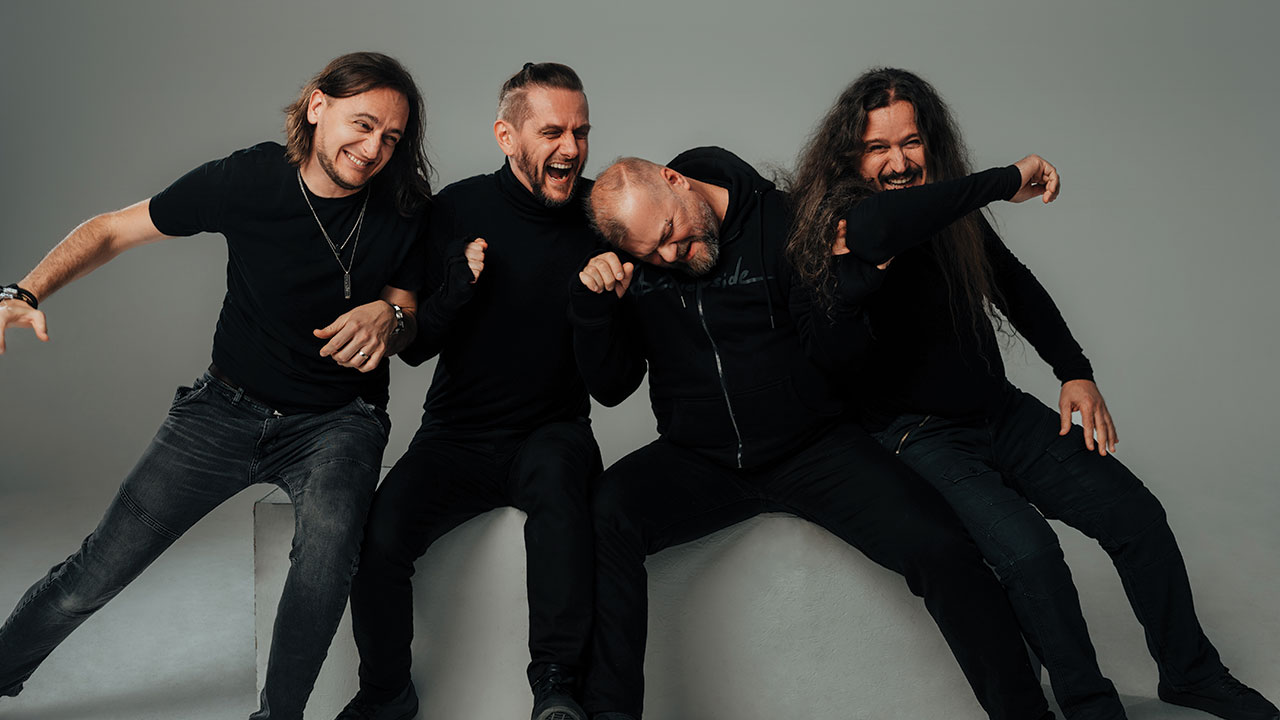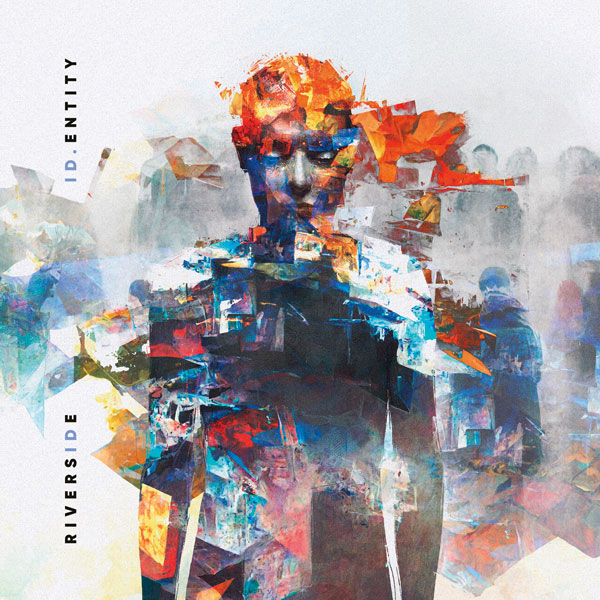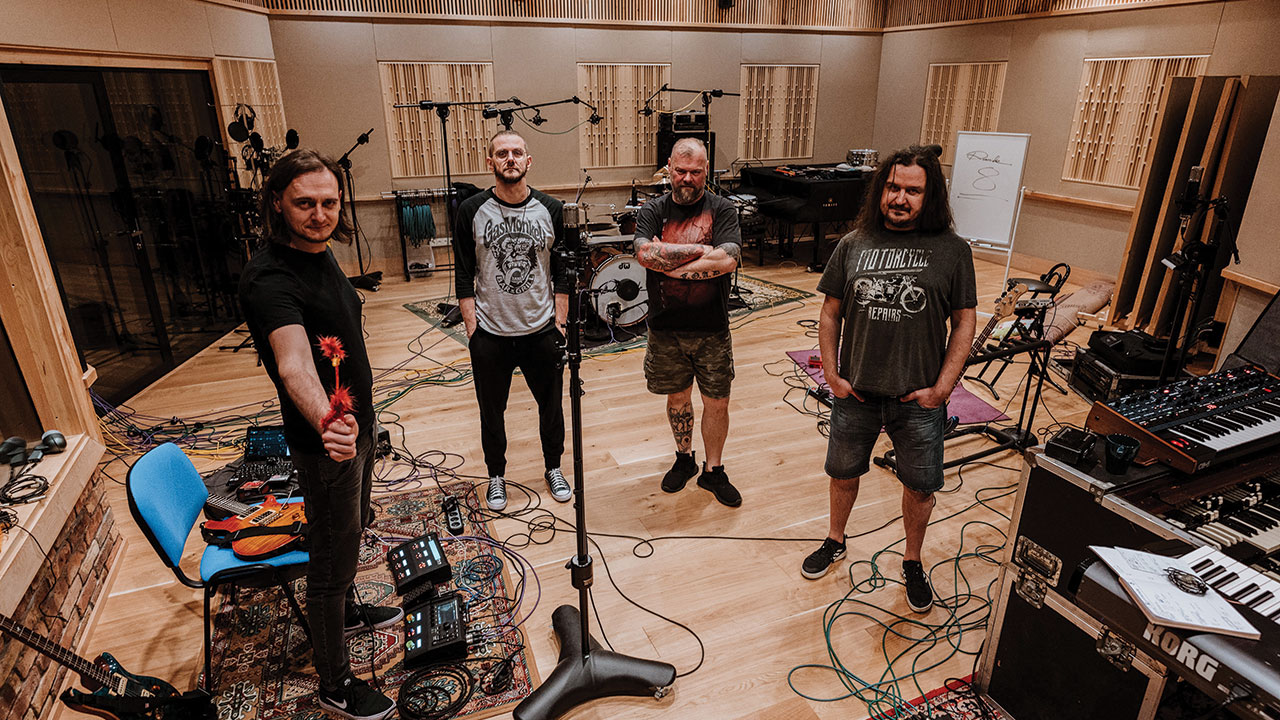
After a break to focus on other projects, Riverside retutned with their eighth album, ID.Entity in 2023. Vocalist and bassist Mariusz Duda told Prog why it was time to break the formula and rekindle the band’s passion for pop.
Mariusz Duda grins ruefully over a video call from his Warsaw studio as he explains the series of creative diversions he’s made over the past four and a half years from the band he made his name with. “Maybe I should admit: I was tired of Riverside’s music. I was tired of this formula. I was tired of being in this kind of rock band.”
Enter stage left something of a blessing in disguise, for him anyway: a global pandemic.
“When lockdown happened, I was grateful, I was happy,” he says. “It meant I could stay home, simply stop touring and be with my family. And then I also had the chance to finish the most recent Lunatic Soul record and focus on different projects – something very different from Riverside.”
He’s not kidding. After Lunatic Soul’s Nordic noir moods and acoustic folk textures were brought to bear on 2020’s Through Shaded Woods, Duda turned out a quick-fire triptych of solo LPs (plus an EP last year) over 2020 and 2021, which blended techno beats with piano melodies and ambient soundscapes.
“I always wanted to experiment a bit with electronic music,” he says. “So I focused on that, and spent a long time working on music on my own.”
That in turn, however, informed his next creative step, as absence from the band setup made his heart grow fonder.
“I missed the guys,” admits Duda. “I wanted to do another Riverside album but I wanted some changes. Something about it being a new decade, the first with a new guitar player… I wanted to bring back the atmosphere of the first four albums, where we were making music together in the rehearsal room, as
a band again.
“It struck me that during our live performances, we always sounded more powerful, more intense. In comparison our albums sounded pretty safe and soft to me. So I wanted to capture this finally on a studio album – this energy, this joy.”

The need for that kind of positive release was inevitably related to the events affecting Riverside during the preceding few years, the most seismic of which was the death in 2016 of Duda’s co-founder of Riverside, Piotr Grudzin´ski. After 2018’s Wasteland touched on the enduring sense of loss the band felt about the guitarist’s sudden death from a heart attack at the age of just 40, Duda wanted this album to let more light in.
“I didn’t want to record the best progressive album of all time,” Duda stresses, “I just wanted to have fun. I wanted to get rid of this melancholy that has run through the last three albums. I was tired of mourning. I was tired of grief and crying all the time. Plus I have Lunatic Soul as an outlet for some of those feelings. So on this album, I wanted to make it a bit… easy listening! Ha ha ha!”
ID.Entity is the result and although a far cry from James Last, it’s probably Riverside’s most accessible long-player to date. Opening track Friend Or Foe? is particularly compelling, blending widescreen, arena-friendly synthpop that is curiously redolent of Norwegian proggers-gone-pop trio A-ha, with crunchier rock passages recalling early 2000s Porcupine Tree, as well as framing proggy song structures around the irresistible melodic pull of 80s MOR.
Mention of such reference points evidently comes as no surprise – or dismay – to Duda, and it leads into the question of who, or what, Riverside is to him. Evidently one connotation of the album title is their ‘identity’ as a unit.
“Riverside was always a bit of a pop band,” he explains. “To be honest, we have lots and lots of simple songs. We never wanted to be King Crimson; in fact, we’re closer to Coldplay.
“I’m not of the generation of 70s vinyl. I grew up on tape cassettes in the 80s – they were my life when I was growing up. Artists like Pet Shop Boys, A-ha, Talk Talk, Kate Bush, plus electronic music like Vangelis and Mike Oldfield or Tangerine Dream. I was into death metal too, but I still miss the good songwriting style from 80s music. They were pop but they had something else. The same with stuff like Mr Mister or soft rock like that. So making this album, why not connect with that stuff? Prog doesn’t have to be all about 70s sounds, right?
“But, of course, we also like long songs, and to create a 15-minute piece sometimes is a really great adventure for us. But this time, I imagined myself being onstage and playing music that works best there.”
At the same time, Duda is clearly under no illusion as to what fans want from a new Riverside album, and isn’t about to steer markedly away from that style.
“I realise that with Riverside I will not achieve super-original music, because of the way a classic band line-up makes guitar-led music. Of course, we experimented in the past with electronic soundscapes, but that was the album I made without a drummer [2016’s Eye Of The Soundscape]. I realise Riverside will never be a Radiohead, who can turn around and make a Kid A. So I just said, ‘Okay, let’s make the best of what Riverside is, and our live shows, the biggest inspiration for this album.’”
That’s evident on the 13-minute centrepiece of the album, The Place Where I Belong, a classically progressive song-cycle that shifts into a sweepingly anthemic hymn to finding yourself. ‘I’ve tried to run away, hide behind makeup,’ Duda sings at first, before touching on personal politics and culture wars (‘What’s my gender, what’s the colour of my skin?’), fake news (‘How much can you bear being fucking lied to?’), limits on personal freedom (‘You grabbed me by the hair and threw me in the same cage again’) and the polarisation of social discourse. Apart from ‘This goddamn anger, coming from every corner’, he notes: ‘Everyone’s divided – extreme right or extreme left, that’s the only choice.’
For Duda, these themes sprung from a clear feeling that he wanted to turn his gaze outward. “I realised that in my mid-40s, I don’t want to write again about my midlife crisis, or ‘Oh my God, I’m so tired of everything, I’m sad, no one understands me enough.’ Maybe it’s time to simply talk about what’s going on around me. And that’s where the idea of ‘Identity’ and ‘ID Entity’ came in.”
Meanwhile, as someone who grew up in communist Poland, then saw the Eastern Bloc disintegrate into what Duda calls “turbo capitalism” which made a few very rich but deepened divisions, he believes the situation is worse than ever now. “There is no middle ground,” he says, “and it’s really sad because people can’t talk to each other anymore.”
That frustration informs lines from the album, such as those on final track Self-Aware advising us to ‘unsubscribe the ones who make us hostile’. “I am tired of toxic people,” he explains. “I am always open to the dialogue – you should always take steps forward to at least try to understand why someone on the opposite side to you thinks that way. And sometimes you can talk and find some compromise. But when I feel that there is someone on the other side doesn’t want to talk, who is even ready to grab a rifle, well… that’s harder, and I have to say, ‘I don’t want anything to do with you.’”
Sentiments like these may seem to contradict Duda’s avowed wish to make a ‘fun’ album, and yet there’s a vitality and brightness to the sounds the band create on ID.Entity that does feel optimistic, defiant and resilient – the work of a band regrouping after the tragedy of Grudzin´ski’s death and the period of soul-searching that inevitably followed, to rediscover their mojo as a creative unit rather than just a vehicle for the frontman’s studio work, as many a prog ‘bands’ end up becoming.
“I wanted everyone to compose the material again,” Duda explains, “or at least, being in the rehearsal room, we could arrange the songs together and make it sound like a band again, not just my work in the studio.”

This process was helped, and fuelled to a degree, by the introduction of a new guitarist in the shape of Duda’s longtime friend Maciej Meller.
“Maciej is my friend from ancient times,” Duda explains. “I knew him back in, like, 1993, long before Riverside started, when we were in different bands [Meller was in fellow Warsaw proggers Quidam]. We were both into progressive rock and our paths would cross from time to time. So when Piotr died my thought was, ‘Okay, should we continue, and if so, who with?’
“He was the first choice because he’s my friend, we’ve known each other for many years and we’re the same age. That was much more important than hiring some young guy who can shred onstage and who will make us look like three grandpas trying to keep up with this young guy who is great, even if it might get us lots of followers on Spotify. But it was a tough choice because he had to learn a new style and Riverside is not a band with a brainstorm [approach]. Riverside has one leader with the vision, like Porcupine Tree or Opeth, and the rest trying to help him achieve those visions.”
While Duda has the final say creatively, though, the new boy is given licence to make his mark on the new record, with ear-catching instrumental breaks on tracks such as The Place Where I Belong.
“It’s one of those moments where I let him be himself and it really shows Maciej’s identity,” says Duda.
So with a new line-up in place, has the main man found a cure for the ‘tired’ feeling he had about Riverside?
“Yeah, I think so,” he says. “I’m proud of the record we’ve made and we had lots of fun recording it. I’m looking forward to touring with this album and this band. During the tour I’ll record the next Lunatic Soul album, and then right after that, I’ll start writing the next Riverside album. I don’t want to wait another four or five years to do another Riverside – I want to write at least one more album like this. I’ve got more to say in the same mood.”
And if that feeling doesn’t chime with people in quite the same way as previous albums? Well, Duda has reached the stage where he doesn’t feel he has anything to prove to anyone. It’s an enduring cliché for musicians to say they create for themselves and the acclaim of their peers is but a ‘bonus’, and it doesn’t always ring true – why put it out there if you don’t want validation? But Duda seems genuinely unconcerned, sounding positively amused by the thought of potential negativity greeting Riverside’s eighth studio long-player.
“Seriously,” he grins, “I don’t care if someone tells me, ‘Okay guys, this is a terrible, terrible album. I think you should give up, finish your career now.’ Fine, I’ll go and do something else.”
We have a feeling that won’t be necessary.







